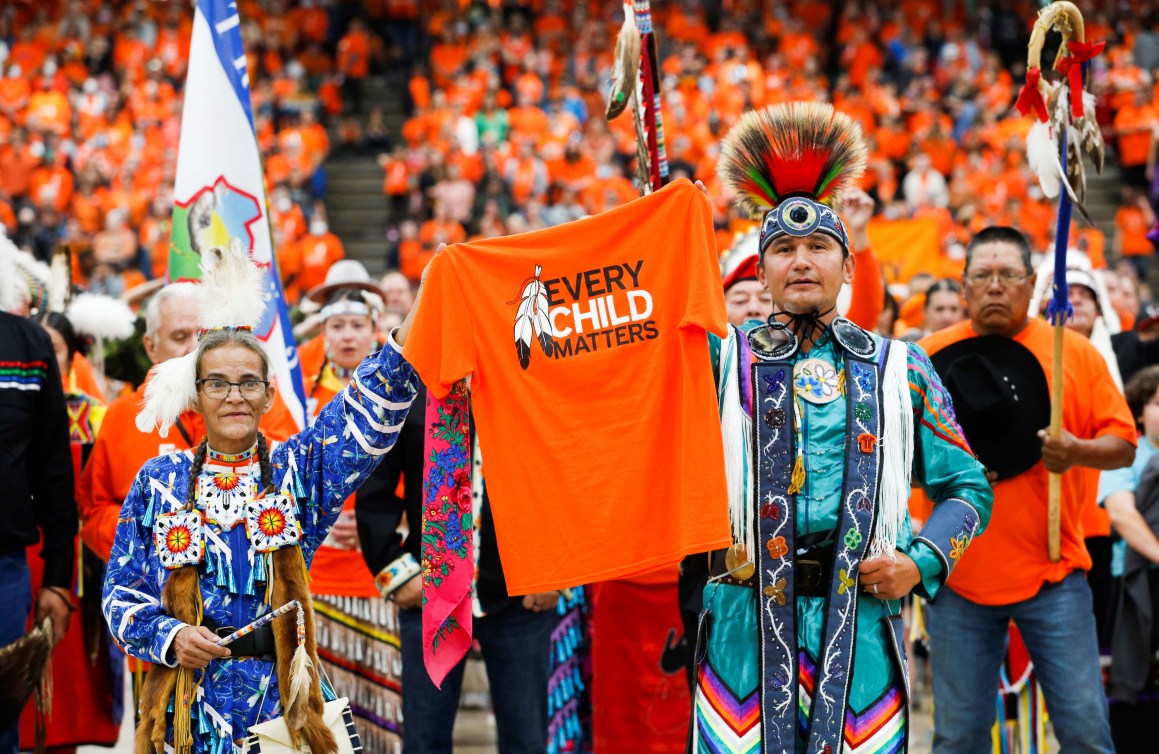Team Canada honours the National Day for Truth and Reconciliation and Orange Shirt Day

Team Canada acknowledges its responsibility as a colonial organization to take an active role in learning, and unlearning, about Indigenous histories on these lands and to continue to play its role on the path to reconciliation. We encourage our team and community to recognize and reflect on Orange Shirt Day and the National Day for Truth and Reconciliation, both of which occur every year on September 30th.
Orange Shirt Day, which was established in 2013, recognizes and raises awareness about the history and impact of the residential school system in Canada. It was inspired by the story of Phyllis (Jack) Webstad, who had her orange shirt taken away from her in 1973 when she was sent to a residential school as a six-year-old. The date was chosen as it marks the time of year when children were taken from their homes and sent to residential schools. The timing also provides an opportunity for schools today to set the stage for anti-racism and anti-bullying policies for the school year.
The National Day for Truth and Reconciliation is a federal statutory holiday created in response to Call to Action #80 by the Truth and Reconciliation Commission of Canada. The day is dedicated to honouring Survivors, their families, and communities while ensuring that public commemoration of the devastating effects of residential schools remains a vital component of the ongoing reconciliation process.
To support our community to learn more about Canada’s history of colonization and the path towards Truth and Reconciliation, the Canadian Olympic Committee has compiled some important resources as well as some suggestions of educational activities.
- Read the Truth and Reconciliation Commission’s Final Report.
- Read the Truth and Reconciliation Commission Calls to Action. These include clear and concrete recommendations to redress the legacy of residential schools and advance the process of Canadian reconciliation.
- Visit the National Centre for Truth and Reconciliation (NCTR), an online place of learning and dialogue where the truths of Residential School Survivors, families and communities are honoured and kept safe for future generations.
- Learn the history of the land you live on or the closest residential schools.
- Read a book, such as
- A Knock on the Door: The Essential History of Residential Schools from the Truth and Reconciliation Commission of Canada by Phil Fontaine and Aimée Craft
- 21 Things You May Not Know About the Indian Act: Helping Canadians Make Reconciliation with Indigenous Peoples a Reality by Bob Joseph
- Five Little Indians by Michelle Good
- Indigenous Relations: Insights, Tips & Suggestions to Make Reconciliation a Reality by Bob Joseph
- The Reconciliation Manifesto: Recovering the Land, Rebuilding the Economy by Arthur Manuel and Grand Chief Ronald Derrickson
- Reclaiming Tom Longboat: Indigenous self-determination in Canadian sport by Janice Forsyth
- Read an article or a report, such as
- “Where are the Children? Healing the legacy of the residential schools” (Aboriginal Healing Foundation and Legacy of Hope Foundation)
- “A history of residential schools in Canada” (CBC News)
- Missing and Murdered Indigenous People: The Report (National Inquiry into Missing and Murdered Indigenous Women and Girls)
- Listen to a podcast, such as
- · Follow Indigenous-led social media accounts, such as
- Notorious Cree (TikTok)
- Shina Novalinga (Instagram)
- Sherry McKay (TikTok)
- Autumn Peltier (Instagram)
- Sage Paul (Instagram)
- Shayla Oulette Stonechild (Instagram)
- Network Reseau (Instagram)
- Toronto Indigenous Harm Reduction (Instagram)
